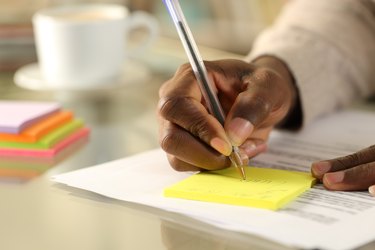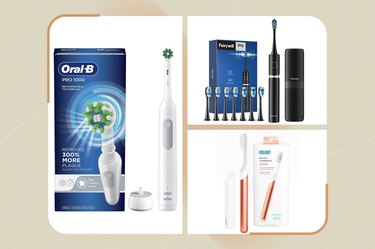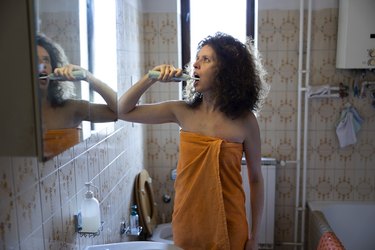
The dentist office may not be your preferred place to be, but while you're there, why not make the most out of your appointment?
Trouble is, it can be easy to try to rush the appointment along, fib about your not-so-great habits, forget symptoms and more. All of those can compromise your check-up.
Video of the Day
Video of the Day
We talked to dentists about the things they wish you wouldn't do at your appointment — and how you can change things up for the sake of your oral health:
1. Fibbing About Brushing and Flossing
The American Dental Association (ADA) recommends brushing twice a day and cleaning between your teeth — such as flossing — once per day.
"People are notorious for not being honest about brushing and flossing," Michael Kosdon, DDS, a cosmetic dentist in New York City, tells LIVESTRONG.com.
It's often that someone might brush and floss as they should for a week or two before an upcoming appointment but then get out of the habit the rest of the year, he says. (For the record, this means you're not actually brushing and flossing as you should.)
But having a dentist who knows about your oral health regimen can help put any current dental problems into context, Dmitry Dolgov, DMD, a dentist with The Dentist Lounge in Santa Monica, California, tells LIVESTRONG.com.
"If a patient claims to maintain diligent oral care but still experiences numerous cavities or gum disease, it's crucial to explore other potential factors, such as gut health, systemic conditions and specific oral microbiome tests," Dr. Dolgov explains.
This is a case where something may be able to be addressed with the right oral hygiene habits rather than a need for additional testing.
No matter how often you do (or don't) brush and floss, you'll want to get brave and be truthful. A good dentist won't tsk-tsk you. Instead, they can make recommendations as to how to get into the habit or make brushing and flossing easier or more enjoyable.
2. Not Sharing All of Your Symptoms
You may have certain symptoms you omit because you don't know you should share them, Alexa Martin, DMD, a board-certified endodontist in Beverly Hills, tells LIVESTRONG.com.
For example, if you have tooth pain, she suggests also keeping these questions in mind and telling your dentist about them: "Are your teeth hot- or cold- sensitive? Are you noticing yourself avoiding chewing on that side? What medications have you been taking, and are they working?"
All these things are important to help your dentist understand exactly what's going on.
3. Arriving Right on Time
Scheduled for 11 a.m.? We hate to break it to you, but arriving at 11 a.m. on the dot is considered…tardy.
"If you show up on time, you're late," Dr. Martin says. "Come even five minutes early. We have the perfect allotted time for you, and we don't want to have to rush your treatment."
Things happen, of course — unexpected traffic, a work call that ran long — so if you are running behind, don't forget to give the office a call.
4. Asking to Skip X-Rays
Dental X-rays provide low-level radiation — they account for a very small proportion of total radiation exposure, according to the ADA.
If you're nervous about getting X-rays, talk to your dentist, who can give you more context on how necessary it is for your oral health.
It's better to approach this as a shared decision rather than outright refusing to take an X-ray or go in assuming that you don't need one.
"There's a huge misconception that if nothing hurts, you have no problems," Dr. Kosdon says.
For things that can't be seen with the naked eye, an X-ray can help pinpoint problems that are brewing under the surface.
5. Omitting Marijuana Use
So, your dentist said you'll need to schedule a procedure that's going to require some anesthesia. You'll want to chime in here, letting them know if you use marijuana, Dr. Martin says.
Your dentist may recommend you avoid doing so at least 24 hours before the procedure, if possible, or they'll take that into account for your pain-management plan.
"Smoking weed revs up the enzymes in your body to eat up the local anesthesia faster, so it's helpful for me to know [if you smoke] so I can plan out how much local anesthesia to use," she says.
6. Keeping Your Medical History to Yourself
Sure, you have separate health and dental insurance, but your oral health isn't actually separate from your overall health.
"Many other health issues, such as high blood pressure, acid reflux, headaches and sinus problems are interconnected with oral health and dentistry," Dr. Dolgov says. "It's important for us to consider these factors when creating a treatment plan."
Likewise, open up about medications you're currently taking. Some medications cause side effects, like dry mouth, which can put you at a higher risk for cavities or oral fungal infections, says the National Institute of Dental and Craniofacial Research.
Dry mouth-creating medications include antidepressants, antipsychotics, anticholinergics, antihypertensives, antihistamines and sedatives, per an October 2017 review in the Journal of the American Geriatrics Society.
7. Taking a Call Mid-Appointment
Yes, life and work move forward, even when your teeth are being cleaned in the dental chair, but if you're spending your time texting or taking a call in the middle of the procedure, you're interrupting the work of the dentist or dental hygienist.
"If you have an important meeting, you'd give them your full attention," Dr. Kosdon notes.
An emergency call — say, your child's school is on the phone — is completely understandable, but otherwise, consider your dental appointment an important meeting on your calendar.
- American Dental Association: "Home Oral Care."
- American Dental Association: "X-Rays/Radiographs."
- National Institute of Dental and Craniofacial Research: "Dry Mouth."
- Journal of the American Geriatrics Society. "Medications That Cause Dry Mouth As an Adverse Effect in Older People: A Systematic Review and Metaanalysis."
Is this an emergency? If you are experiencing serious medical symptoms, please see the National Library of Medicine’s list of signs you need emergency medical attention or call 911.


